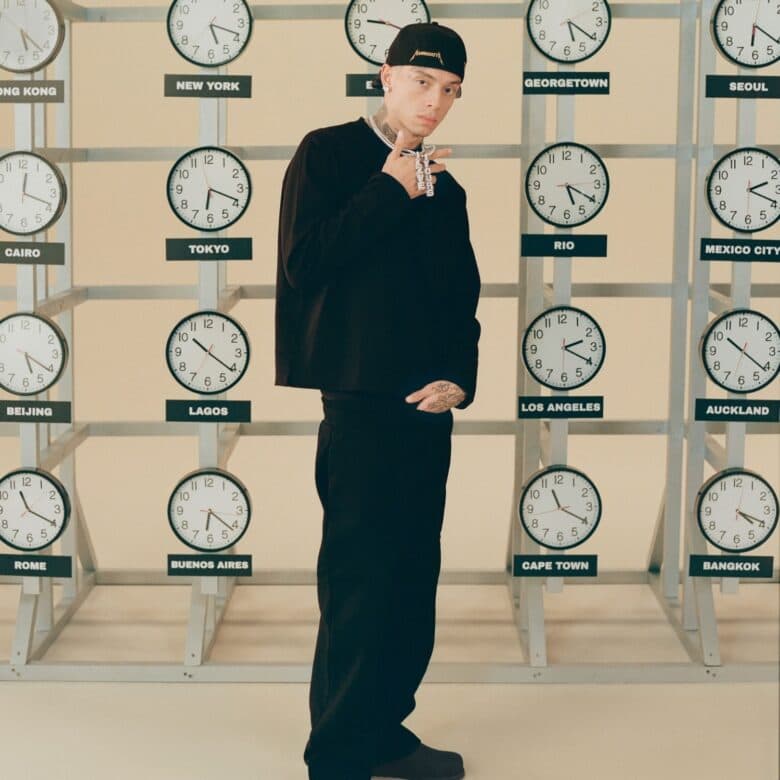Moncrieff: “If men cared less about trying to seem hard, they’d probably be a lot happier”

When Moncrieff joins the video call, everything in the shot seems to allude to a different element of the artist’s story — the west-Ireland field visible through the window a nod to the singer’s roots, pink hair evoking the artist’s characteristically fluid stance on dress, the guitar resting on his lap an unsubtle ode to his craft. It’s not just a wanky prop, though, Moncrieff has actually taken the call mid studio session, where he’s working on a secret track for the deluxe version of his debut album, Maybe It’s Fine. “It’s my BRAT version,” he quips. When Moncrieff begins to speak, any whimsical ideas about luscious Irish fields are replaced by good, old-fashioned craic, and the singer jokes that “bopping around” to his latest single releases, “Shangri-La” and “Hard Feelings”, requires having “a whole lot of cardio done” in comparison to his usual and decidedly more downbeat repertoire.
Moncrieff lore makes sense of the artist’s usual penchant for the grittier stuff, though. “I began making music as a way to make sense of things that happened to me as I was becoming an adult,” he says. “Like losing my brother and my sister primarily.” With the tragic loss of two siblings as a teenager, Moncrieff describes his foray into music as an act of “self preservation”. Having grown up in a small town in Waterford in the southeast of Ireland, Moncrieff recalls being surrounded by “very strong male stereotypes where men don’t talk about their feelings”. “As a teenager,” he says, “and being a boy, trying to emotionally explain yourself and articulate yourself is basically impossible.” Music, then, became a very necessary outlet for the then-adolescent Moncrieff.

What music wasn’t supposed to be, however, was a career. Moncrieff was actually studying for a law degree when his “obsession” with his hobby prevailed. “I just realised that life is way too short and I wanted to do something that meant something to me,” he explains. “I dropped out of college and went from law to music, which is a very good career move. Very stable,” Moncrieff laughs. A whistle-stop tour of the next few years sees the artist move to London and “fumble around” working at Banana Tree in West Hampstead while playing open mics, before having four record deals pop up and fall through. “I didn’t have a clue what I was doing,” Moncrieff recalls. “I was kind of chasing a bit of a feeling.” Eventually, though, the turning point came when he released his first EP, The Early Hurts, which got picked up by Elton John’s Rocket Hour radio show and switched his “what the hell am I doing out here?” mindset on its head.
It also helps, the singer laughs, that he “eventually started to write songs that weren’t actually bad”. It turns out, though, that Moncrieff had a lot of practice, having wracked up over five hundred tunes over the years. One might assume whittling that down into twelve tracks and “a body of work that I can really identify with from the last, like, ten years” would be bit of a task, but Moncrieff jests that within his vast archive “there’s a lot of bad songs, so it’s not as hard as you think”. Self-deprecation aside, the track list of Maybe It’s Fine was actually informed by the stories that inspired each song. “I think it’s all about what they represent,” Moncrieff says. “If the stories are strong enough, then the rest will sort itself out, you know?” These stories, then, range from the intoxication of reckless infatuation, to navigating the different versions of ourselves experienced in our twenties, to accepting that you might be the villain in one person’s story, but the hero in another’s.

While the lyrics in Maybe It’s Fine explores many forms of acceptance, the corresponding visuals, you could say, tackle others. On the album’s cover art, you can catch Moncrieff in a slightly alternative take on a hurling outfit (read: jersey with a “sexy crop”, pink hair and “oiled up” limbs). “If you look at it this way,” the artist muses, “if people think being masculine is being courageous and being strong and brave, what’s more masculine and brave than being the truest version of yourself?” He continues: “We’ve fallen into [seeing] masculinity as a set of social codes — you wear this kind of clothing, you talk this much about how you feel.” As a result, the album is also an ode to self-expression, perhaps even setting an example for boys that Moncrieff himself didn’t have. “Growing up I had a bit of a hard time,” he says, “‘cause I liked wearing different kinds of clothes. I liked music. I liked poetry. I liked creating stuff. And where I’m from that was seen as, like, ‘gay’ or feminine, as if expressing yourself was consistent with your sexual identity or your gender.”
While moving to London was ultimately the making of Moncrieff’s music career, so too was it the birth place of his truest form. “I’d dulled down a lot of myself in order to fit in,” the artist says, “and as I grew older and settled into my skin, especially moving to London — making new friends, people from different communities, people from the queer community — I realised that you can be a man and paint your nails, or wear whatever clothes you want to wear. It doesn’t affect your masculinity.” From holding pints of beer in his manicured hands to posting reels of himself boxing punching bags with the words ‘toxic masculinity’ inscribed on them, Moncrieff isn’t shy about leaning into his own view of what it means to be a man. “I think, if men cared a little bit less about trying to seem hard,” he says, “they’d probably be a lot happier.”
Ultimately, then, Maybe It’s Fine is all about making peace with, well, just about everything — whether that means accepting yourself, the roles people have played in your life, or the ones you’ve played in theirs. “When I got all these songs together,” Moncrieff says, “it kind of made me realise that like everything I’ve been through, from the lowest parts to the highest highs, has made me the perfectly flawed human being that I am. And that’s where I got to, you know? Maybe it’s fine.”

- WriterScarlett Coughlan
- PhotographerSaskia Kovandzich




